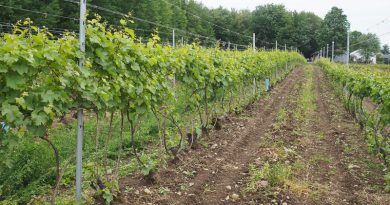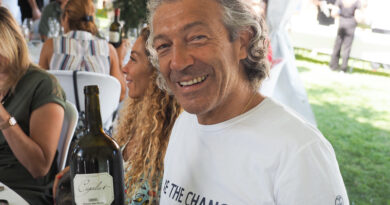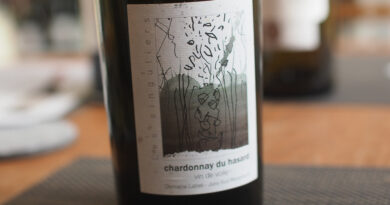So you want to be a wine writer?
I think it was Hugh Johnson who first came up with the memorable phase: ‘wine needs words’. While we are unlikely to read newspaper columns about cheese, or consult our favourite wheat writers, or select beef, apples or apricots based on expert advice, it seems that wine is a bit different. I can think of two reasons. First, it’s innately complex: such a fragmented, highly distributed product category that there is the need for experts to help consumers navigate it. So we have the ‘wine writer’ and with it a calendar of press trips and events where this special breed of communicator gathers at other people’s expense to generate words about wine. Second, it’s also glamorous. Wine is sexy: often, rich people decide that as a second career they’d like to buy a winery. It’s a popular second career. There’s something special about wine, and grapes are the rock star of agriculture. Wine is a product where the composition of the raw materials defines its nature and quality potential.
As you can imagine, the job of wine writer has broad appeal. Would you like to be one? I’m assuming you can write, that you are interested in wine, and perhaps you’d like to make a living communicating about it. If that’s the case, I have some good news for you, but also some bad news.
The good news: all can play!
First, the good news. The wine world welcomes newcomers! I came into wine from the outside, relatively late in life. And it’s how I now make my living.
I started a wine website back in the late 1990s when the Internet came along, and began discussing wine on the various wine bulletin boards. The Internet was much smaller then, and so newcomers like me got to hang out online with professionals, and this proved a valued opportunity to learn a lot very quickly. I visited my first vineyard in 1996 as a consumer, and I was hooked. My Geocities site became wineanorak, and in 1999 I registered my domain name. In 2000 I got my first paid commission, writing a glossary for new ecommerce wine site Virgin Wines. Then in 2001, realising that the Internet wasn’t being taken seriously, I pitched to magazine editors and began writing for both trade and consumer publications.
For nine years I wrote about wine as a side-line to my day job, science editing. In 2004 I got a book deal (for Wine Science) and in 2005 landed a national newspaper column, all while I was full-time employed. It was tremendous fun, and in 2008 I went freelance. I didn’t have any connections in wine, I had no money behind me, and I didn’t have a partner with a high-paying job. I had to make it work.

The changing media landscape
But the wine writing landscape was already beginning to change significantly. The very changes that opened the door to me were also about to disrupt the media landscape.
When I started out, it was early days for the internet, and print and TV media had yet to feel the effect of this new communication medium. Newspapers still hired specialist wine commentators on full-time professional salaries to deliver a column a week, usually on Saturday or Sunday. Wine books still sold well. If you were one of the lucky ones who had a column like this, then you were in a happy place. It’s unimaginable today, of course. And a decent book deal could make you a full time living as a writer.
There was also a small group of professional wine critics. These were wine writers, but their focus was almost exclusively on tasting as many wines as possible and then rating them. Back then, Robert Parker was the most visible, but there were also those who worked for major magazines, such as The Wine Spectator. This was largely an American phenomenon, but their influence spread further than just the USA. Between the newspaper columnists and the critic publications, it was very clear who was a wine writer. It was a sought-after occupation, but the door wasn’t really open to newcomers. You needed an ‘in’ to join this club.
So that’s the good news. If you have something interesting to say about wine and you can find your own audience, then there’s an opportunity to take part in wine communication. The door is open.


The bad news
The bad news? It is much more difficult to make a living in this sphere. This is because of the significant shifts in the media landscape. How things have changed over the last 20 years! There has been a revolution in media, and the internet, and more recently the emergence of social media, has changed everything. In particular, Facebook and Google between them have swiped most of the advertising money that previously supported professionally generated content in newspapers and magazines. Now, that money follows user-generated content on social media, and the need for professional content has reduced significantly. There is no longer the same pot of money to pay writers.
When I got a newspaper column in 2005 (I’m still doing it now, 19 years later), pay was around an eighth of what it would have been a few years earlier for a similar gig. In 2007 I began using Facebook, in 2009 Twitter and in 2013 Instagram. These social media channels opened massive new opportunities for content creators – but the difference is that much of this activity is unpaid.
Now there are still words for wine, and lots of them. Many more people than before have developed a voice, and an audience, thanks to the internet and social media. Some established writers – like myself – have adopted social media and used it extensively as another communication tool in addition to printed work. But many are writing about wine solely on social media. In particular, we now have lots of wine lovers communicating on Instagram, and some of them with quite impressive levels of engagement.
The barrier to entry has lowered, and the gatekeepers of old are no more. To publish, you don’t need to go through a commissioning editor. If you can create a social media profile, or cobble together a blog, then you can begin to find your tribe. Largely, this change has been very positive, and some fresh new voices have emerged. From my perspective, I wouldn’t be doing what I’m doing without the internet opening doors for me, so it would be churlish to resent the entry of others.
Lost in a sea of content
There are some problems with this new media landscape, however. First is that there is now a sea of content, and the true signal often risks being drowned out by the noise. The second is that because very few publications pay properly for content, the number of journalists who write professionally – devoting their full time to gaining the expertise and knowledge needed to do their job well – is vastly diminished. And those who are making a living out of this can’t justify significant research time if they aren’t being paid properly for their pieces. They need to yield much more highly to make the money add up to a full-time living.
Yet at the same time, wineries need independent voices to talk about their wines. They have marketing budgets to pay for promotion. The wine trade needs people to write about wine because this is such a complicated and dynamic world – after all, things change every vintage.
There is no doubt that this is now a crowded field, and there will be competition. One of the problems for people like me is that when I started out I was competing with people who didn’t have a to make a living from their wine communication work because they either had plenty of money behind them from a previous career, or a partner with a well paid job. This has got worse: there are a lot of part timers out there, and they can do work for free or near free. Some of them look like are important, because they have by-lines from well-known media groups. But there are some big media brands out there who hire people to work for very little money to create content. One positive spin on this is that if you have to make a living, it keeps you focused. The struggle inspires and it removes the danger of complacency.
One positive change is that the category of ‘wine writer’ has broken down a bit. Now we have lots of different sorts of wine professionals acting as communicators, and working across a range of different media. I love that some viticulturists I follow provide really high quality content explaining what goes on in vineyards – and when they have a talent for communication, they have quite a reach. The same goes for what takes place in the winery – now, thanks to some instagramming winemakers we get to see it in action. But perhaps the best placed to communicate about wine from a solid body of knowledge are sommeliers and importers, and some important voices have emerged from these ranks.
From amidst the noise of modern media, and despite the demise of the traditional media model, wine communication seems to be in rude health. The best voices will rise to the top. And there’s never been a more exciting time to be involved in the world of wine, which is as dynamic and inspiring as ever.

Tips for wine content creators
So what are my tips for those who want to make a living out of wine communication?
If possible, build up your career while also holding down a day job. This is easier said than done, but it takes the pressure off if you aren’t scrabbling around for cash. If the day job is in wine, this can be helpful because it will give you valuable experience. Avoiding financial pressure is advisable, because otherwise you end up taking gigs you’d rather not, and it removes the temptation to compromise your ideals showcasing wines you don’t like simply because there’s marketing budget available.
The wine world is a small one. Be nice, collaborative and collegiate. You don’t get to win by defeating others. Your life will be much more enjoyable and satisfying if you can avoid seeing your colleagues as competitors. As a new entrant to the field, don’t try to take out the established authorities. That’s not how it works. You will gain recognition for the work you do.
Be authentic and find your own way. There are many routes to success in wine communication, and using the tools that come most naturally to you will probably get you to where you want to go the fastest. There are good examples of single-medium communicators who are doing well, but this brings with it the danger of a changing algorithm on your favoured platform, or it falling out of favour of your media tool or brand.
The freelance life is a precarious one, with times of feast and famine – hopefully more of the former than the latter. Plan accordingly (and this advice is not specific to wine writers). Budget carefully and leave a buffer if possible. Living on the financial margins may lead you to make poor decisions when it comes to work, and if you aren’t careful you’ll just be doing jobs you hate because you need the money. This is one reason for keeping a day job for as long as possible. When I began, I was the sole earner in a family of four, and it was tough, but it worked out. So this is advice I’ve had to live by.
Beware the danger of your first success. It can get to your head. Keep doing what you did to achieve this success and remember that success can be a danger if it leads to complacency or behaving in ways that are non-ideal. ‘You are a big shot now,’ a winemaker friend said to me after I won my first award. I listened to this warning, and I changed my ways.
Don’t pull up the drawbridge after you. If the barrier to entry was low for you (it was for me), why shouldn’t it also be low for the next person? Don’t expect something of a new wine communicator that was never expected of you. Competition is good for everyone. You will get your portion. You don’t have to beat everyone else in order to have succeeded.
It’s lovely, as a newcomer, when authorities in the field welcome you and provide support. But don’t be surprised if later, as you begin to develop your career, some of them become less supportive and even antagonistic. Even narcissists get benefit from helping others, as long as there is clear distance between them and their mentees. They will quickly turn, though, if you get anywhere close to them in professional standing.
How much should you charge for your services? Everyone has a different business model, and mine is to charge more for some work than others. Why? Because if you look at some gigs they are very good for building up your profile, but there’s hardly any budget. So if you go in with your normal fee, you won’t get the work. Of course, some gigs are sold as ‘building profile’ by cash-strapped organizers when they are useless for this, and they are an easy ‘pass’. But others are genuinely worth doing, and then you can reap the rewards elsewhere. ‘Knowing your value’ and sticking to this figure sounds great in theory, but it might mean the difference between having a career in wine communication or not. It’s always good to get a feel for what other people are being paid. I like letting others propose a fee, but if I’m asked for mine and others are taking part in the same event, I’ll ask to be paid no less than others are. For writing work, you are usually offered a standard fee when commissioned. In the UK writing fees have always been around half of those in the USA, or sometimes even less. I recommend being flexible in negotiations and also very open: usually organizers of events will tell you if your fee is too low or too high if you ask them nicely. Remember: you are not being paid per hour. You are charging a fee reflecting your ability, experience and reputation. If you are travelling for a gig, I’d recommend dropping the ego and not insisting on premium cabin air travel, which munches through budgets without providing you much benefit. I once negotiated a heftier fee and flying in the back of the plane when offered business class flights to Australia. They saved on their budget; I got paid properly. Win/win. [If you absolutely can’t contemplate economy long-haul travel, wine communication is not the career for you.]
Finally, have multiple income streams. I’m assuming here that yours will be a freelance existence: proper full-time jobs for wine writers are more-or-less extinct. To end up with enough money, and to keep cashflow at something approximating a steady level, then try to establish lots of streams. Having a few monthly regulars in the mix helps a lot, as well as royalties from a few books that keep trickling in. You will be doing some writing, but also some other forms of content generation, and you may have to take gigs that have nothing to do with content generation. Nothing is forever: gigs start, they come to an end. Being at peace with this sort of uncertainty makes this line of work much easier.




